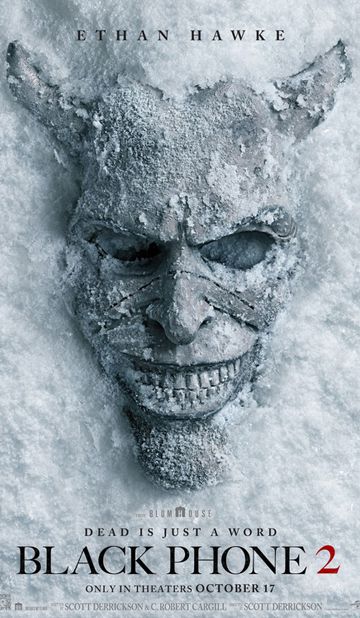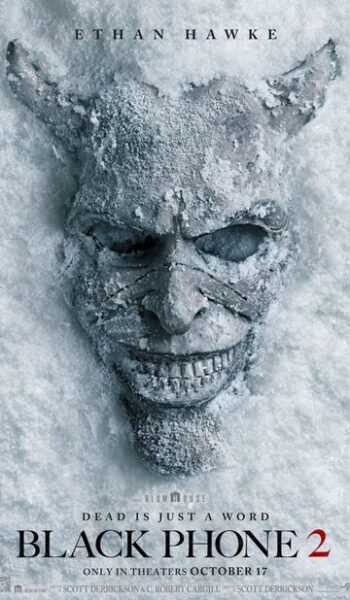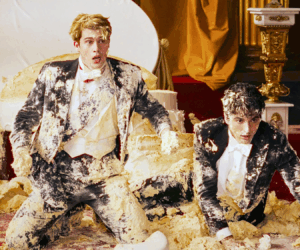
The year 2025 has rightfully earned the title “the year of horror.” The genre has been on a roll, flooding cinemas with everything from long-awaited sequels to ambitious new originals. While Sinners and Weapons have become the standout horror hits of 2025, raking in over $300 million globally, others like M3GAN 2.0 and Until Dawn didn’t exactly strike the same chord.
Among this year’s haunted offerings is Black Phone 2, a follow-up to the 2021 hit Black Phone, a sequel that decides to swap the brutal slasher edge of the first film for something quieter, stranger, and way more supernatural.
Directed by Scott Derrickson, who’s built a solid reputation in horror (Sinister, The Exorcism of Emily Rose), Black Phone 2 continues the story that began in 2021 with Black Phone.
A Quick Look Back At Black Phone
The first Black Phone was a standout horror film that mixed old-school scares with emotional storytelling. Adapted from Joe Hill’s short story (and yes, Hill happens to be Stephen King’s son), the film introduced us to The Grabber, Ethan Hawke’s chillingly masked kidnapper of young boys. When teenager Finney (Mason Thames) becomes his next target, he discovers that the souls of the Grabber’s past victims are reaching out to him through a disconnected, dusty phone in the killer’s basement. It was a strange, emotional, and genuinely terrifying mix of ghost story and survival thriller.
READ ALSO: Chainsaw Man’s Reze Arc Is Proof That Even Devils Want Love
Picking Up the Call Again in Black Phone 2
The sequel opens with an eerie scene as we see a woman making a phone call from a lonely payphone in a snow-covered area, claiming she found a mysterious number carved into the ice.
We then catch up with Finn, still trying to move on from the trauma of killing The Grabber in the first film. He’s older now, rougher around the edges, and has picked up smoking as a way to cope. His sister, Gwen, on the other hand, is still plagued by psychic dreams as she has visions of the three kids The Grabber killed, each dream more disturbing than the last. The kids keep repeating a message: “WBH.”
These dreams eventually lead Gwen and Finn to a Christian youth camp that their late mum used to attend, a place with its own dark history. Gwen is guided there through visions of her mother, who also had the same psychic abilities before she took her own life. Finn tags along, not because he believes in her dreams, but because he wants to protect her.
Gwen’s psychic connection deepens here, guided by visions of her mother and the lost children. The camp, shut down years ago after three boys disappeared, is soon revealed to be a key site in the Grabber’s grim past.
Things take a darker turn when an old payphone at the camp, said to have been broken for over a decade, starts to ring again. Only Finn can hear it, and when he picks it up, he’s greeted by the chilling voice of the Grabber himself.
READ ALSO: From Bullies to Betrayers: 7 K-Dramas That Serve Revenge Piping Hot
The Grabber Returns, Sort Of
If you’re wondering how the Grabber is back after he died in the first film, the truth is that he isn’t. His spirit is. This time, he manifests through Gwen’s dreams, attacking her physically and leaving physical marks on her body in the real world. The sequel shifts from gritty realism to supernatural horror, leaning less on gore and more on psychological and spiritual torment.
Ethan Hawke returns, but this time we barely see him. Most of his appearances come through distorted phone calls or ghostly visions. The mask is still there, still creepy, but The Grabber feels oddly muted. He doesn’t talk much, and the few times he does, his words don’t land with the same unsettling punch as before. I found myself wishing we saw more of that twisted, unpredictable side of him.
Themes of Trauma and Faith
Where The Black Phone explored survival and fear, The Black Phone 2 delves into the aftermath of how surviving horror doesn’t mean escaping it. Finn channels his trauma through aggression, while Gwen grapples with inherited psychic abilities and fears of ending up like her mother, who took her own life to silence similar visions.
The film introduces faith as a major theme, showing how Gwen’s connection to her late mother and to the spirit world forces her to navigate between religion and horror.
What Works
Madeline McGraw shines as Gwen. Her performance is intense and emotionally charged. Her dream sequences of how The Grabber kills the three children are shot in grainy Super-8 style, and they add to the film’s visual highlight with their eerie, unsettling nature.
The snow-covered Christian camp also adds a fresh aesthetic to the sequel. The isolation, creaking bunk beds, and howling winds build a slow, creeping dread. The sound design makes every gust of wind feel like a whisper from the beyond, every crunch in the snow like someone following just a step behind.
READ ALSO: As a Die-Hard K-Drama Lover, These Are the Romances You NEED to See
What Doesn’t Work
Where the first film thrived on tension and mystery, Black Phone 2 occasionally feels weighed down by its own lore. The rules of the supernatural are muddled, and the story sometimes trips over its attempts to connect the Grabber’s ghost to Gwen’s psychic lineage. There’s also a noticeable absence of the raw terror that defined the first film, as Black Phone 2’s horror is quieter, more emotional, but less terrifying.
While Ethan Hawke’s Grabber character is still a striking presence, he feels underused. The mask may still send shivers down your spine, but without his deranged, unpredictable behaviour, the fear doesn’t hit quite as hard.
Finality, Black Phone 2 is a haunting yet uneven sequel. It trades the first film’s grounded terror for a ghostly, spiritual story about trauma, grief, and faith. While not as frightening or tight as the original, it still has strong performances, a clever atmosphere, and enough emotional weight to keep viewers hooked.
It’s not a scream-out-loud kind of horror; it’s more of a slow, icy shiver that lingers long after the credits roll.
Rating: ★★★☆☆ (3 out of 5).








